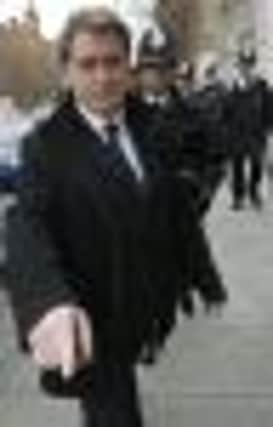Speaker: More MPs seeking help for excessive boozing


The news comes as parliament attempts to crack down on Westminster’s drinking culture.
Mr Bercow also suggested there may be politicians with “other addiction issues” as he insisted the House reflects wider society.
Advertisement
Hide AdAdvertisement
Hide AdIt emerged last week that Commons staff are to be told to top up MPs’ glasses fewer times at parliamentary receptions to encourage “responsible alcohol use”.
The move comes in the wake of the fight in the Commons Strangers Bar that saw Eric Joyce attack fellow MPs.
The disgraced politician recently admitted he had a problem with alcohol and said he wanted to address his drinking because he feared it could end up killing him.
Mr Bercow said there was no longer a heavy subsidy on alcohol served in parliament’s bars.
He said: “I think that there are a number of other factors. I think there are issues relating to members who have had too much to drink.
“I think it is important that the medical service in the House is aware as it can be of members with problems. There is some evidence now that more members and staff who have got drink-related issues are seeking help and that’s a positive.
He added: “I think we are a reflection of society and just as there are people in every walk of life who have got issues to do with alcohol, and possibly other addiction issues, there can be problems in this place.”
Sir Malcolm Rifkind, a former foreign secretary and Edinburgh Conservative MP who now represents Kensington, said: “I think that there is a small minority of heavy drinkers, but the reality is at Westminster you get a cross-section of society – some people who drink, others who enjoy an occasional glass and others who don’t really drink at all.
Advertisement
Hide AdAdvertisement
Hide Ad“What is different I suppose is that people are there for long hours. For example, hanging around for voting to take place, people might have a drink or two – but in other office environments people might go to the pub after work.”
Mark Lazarowicz, Labour MP for Edinburgh North and Leith, said politicians’ lifestyles – with long working hours, a stressful job and often working away from home – were all factors that had the potential to lead people to drink.
“At Westminster you have politicians and thousands of staff so there is bound to be a time when some people develop problems,” he said.
“I think it has been grossly exaggerated and highlighted because of recent events, but I do think it is right to review policy.”
Mr Joyce was forced to resign from the Labour Party after a bar brawl in February. The MP for Falkirk tendered his resignation from the party as he apologised for his behaviour.
He has, however, vowed to continue as an MP.
He told the House he “had a number of personal issues to address”, adding that his behaviour in the Strangers’ Bar had “fallen egregiously below what is required” of an MP.
Mr Joyce, a former Army major, headbutted Stuart Andrew, the Conservative MP for Pudsey. He also hit Tory councillors Luke Mackenzie and Ben Maney, and Labour whip Phil Wilson, MP for Sedgefield.
Mr Joyce, of Bo’ness, near Falkirk, was given a 12-month community order which included a curfew from Friday to Sunday.
He was fined £3,000 and banned from pubs for three months. He was also ordered to pay £1,400 in compensation to his victims.